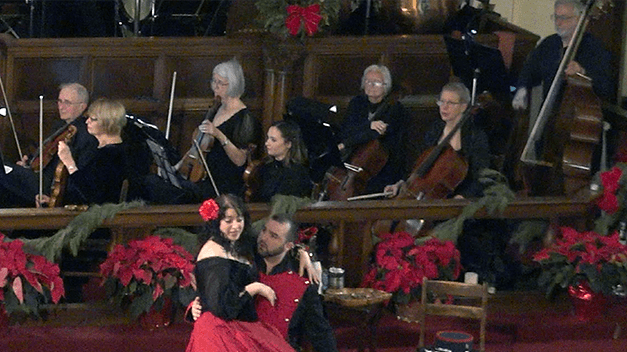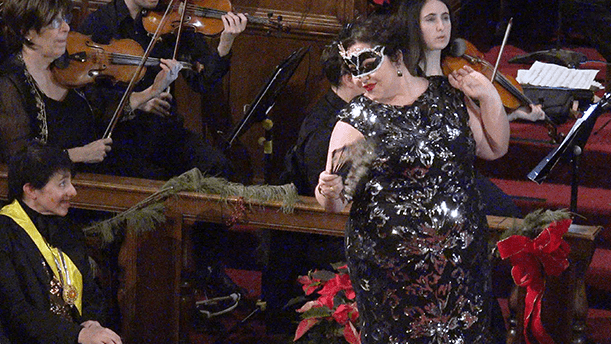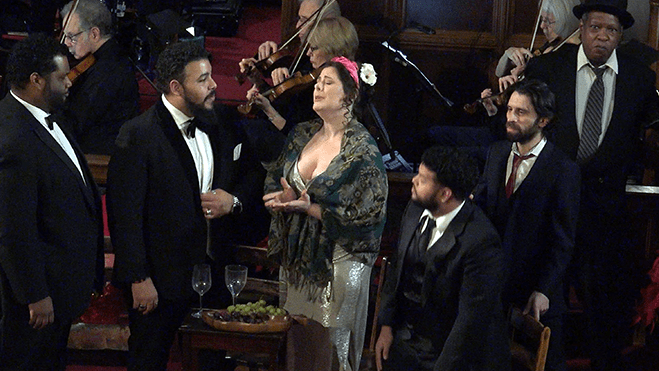On December 31, the Amore Opera celebrated the incoming 2020 with a glorious New Year’s Eve gala of opera and dinner at St. Paul & St. Andrew’s Church in New York City. Nathan Hull welcomed one and all to the Amore Opera’s tenth seasons. Many received New Year hats and noisemakers to properly ring in the new decade.
The event’s organizer, Hull runs the Amore Opera in the style of the late beloved Anthony Amato, who retired in 1909. Hull staged the Amore Opera’s first performance of La Bohème, conducted by maestro Richard Owen, who returned tonight to help Amore Opera celebrate its tenth year. The second acts are usually joyous and the main characters haven’t been subject to tragedy yet.
But before La Bohème, Carmen and Die Fledermous, the ebullient and elegantly attired host Nathan Hull had the singers entertain us with one of his favorite operas, Giacomo Puccini’s operetta La Rondine (1918). The quartet was caressingly sung, and this bittersweet opera does not end tragically. But as in the 1965 film masterpiece The Umbrellas of Cherbourg (with its touching score by Michelle LeGrand), the couple’s love dies, removing them from the life that could have been but never was.
La Bohème Act Two takes place at the Café Momus on Christmas Eve in Paris. Four starving artists share a flat and are out for a night of frolic. All are desperately poor: Rodolfo, a poet; Marcello, a painter; Colline, a philosopher; and Schaunard, a musician. Rodolfo and Mimi fall in love, but Musetta, his ex-girlfriend, is there with her new older and richer companion. Musetta (Victoria Wefer) flamboyantly arrives, then sings “Quando m’en vo” in a beautiful soprano, hitting the highs with sensual splendor. Her screams of pain from ill-fitting shoes were piercing enough to fool Alcindoro, amusingly played and richly sung by David Owen, into going out to buy her another pair, thus giving her and Marcello a chance to kiss, embrace and “make up” gloriously. When Alcindoro returns he is handed the bill as Parpignol, the toy vendor, leads a parade for the children. The Rodolfo was rising tenor José Heredia, who sang some truly golden phrases. He is becoming one of the best lyrico spinto tenors and is a proud son of Santo Domingo.

Iris Karlin & Riad Ymeri
Courtesy of Amore Opera
The spirited Marcello of majestic baritone Jonathan R. Green was impressive, and his interplay with Musetta was fun to watch even when she doused him with water. Mimi was portrayed by Rachel Hippert, Schaunard by Samuel Flores and Colline by Gennady Vysotsky. The guests, Alexys Tiscareno and Luka Fric, made their presence known with color and flamboyance and vocal elan.
Carmen was next with its thrilling overture offered as a special gift by Maestro Richard Owen. In my young boyhood the Carmen overture was part of our music appreciation class and made me take notice of such classical gems!
Iris Karlin was a sultry, subtle, sexy Carmen. Her Seguidilla was a whirlwind of precision and passion and her “tra la la” melody was as caressing as the cloth that captured the dead fresh off the guillotine. Ms. Karlin knows Carmen inside and out. Her Carmen was calculating, contemporary, and freedom-seeking. Her Don Jose was Albanian tenor Riad Ymeri, whose years in Italy led him to his career here. When my wife Judy and I first heard him as a marvelous lyric tenor I did not think of him as Don José. His superb singing of the flower song tapered on the high finale was heartwarming.
Megan Marod caught the eye and the ear as Frasquita. In ensemble, her dynamic soprano ultra high notes stood out and her acting enticed. Perri Sussman was stellar as Mercedes. Escamillo was in the able hands of Roberto Borgatti whose robust baritone made the most of “Votre tost” (“The Toreador Song”) and whose machismo put him in the realm, somewhat limited today, of good manly Escamillo’s. Rick Agster excelled as Zuniga, Julio Mascaro as Remendado and Thomas Geib as Dancairo. Trey Sandusky was “a su sordones” as Lillas Pastia (at your service). To see Don José and Escamillo thrust knives made me think of Judy and myself at the soon-to-come dinner.
After a superb dinner of pasta, fish, fowl, wine and countless other foods, we headed back to the Church theater for Die Fledermous. Johann Strauss’s opera is full of waltz melodies and is also called the Revenge of the Bat. The action takes place in Vienna on New Year’s Eve in the 1870s. Dr. Falke invites his friend Eisenstein to attend a party at Prince Orlovsky’s mansion, instead of serving a jail sentence. He also invites his widow Rosalinde so she can see her husband’s philandering. The jailer Frank is invited as a French Marquis and the fun and frolic begin.
Mezzo soprano Hayden DeWitt was Prince Orlovsky. The essence of androgyny with her male attire, strong mezzo, and mustache, she looked like Charlie Chaplin and Al Pacino. Her “Chanson a son gout” aria was done with sparkle and wit, and her King Champagne song certainly suited the evening. Blame it on Rio was a film with Joe Bologna and the excuse for all his wrongs was Rio de Janeiro, so whatever happens here, blame the champagne. Ashley Becker used her rich, flexible, captivating soprano in her Hungarian Gypsy song, ending with a brilliantly sustained high note. Her chasing her husband for his gold watch evoked memories of the great film comedian Marie Dressler, who was hilarious in Tillie’s Punctured Romance, a silent feature where she was a match for Chaplin. Becker has a great flair for comedy, which along with her superb voice should serve her well in a diversity of roles. Her chase with Eisenstein matched Chaplin and Dressler on roller skates in Tillie’s Punctured Romance! Brava!

Ashley Becker & Christopher Eaglin
Courtesy of Amore Opera
Gabriel von Eisenstein was Christopher Eaglin, whose baritenor was impressive, eagerly expressing dismay and dishabille in his problems. Adele the chambermaid was sung and acted by Alea Vorilla, whose lovely soprano soared with coloratura agility and generous tone.
Baritone Robert Garner was Dr Falke. His silken voice has a robustness evoking the greats of the past. The Bruderlein song with cast and chorus always touches all the right spots.
James Stephen Longo was the absolute Ivan! Kristina Malinauskaite was Sally, ingratiating and noteworthy, and Jay Gould was Frank, the governor of the jail. His fine comedic stance and dark deep voice made him a formidable presence but always irresistibly amusing. He is a great Gilbert and Sullivan performer. The conductor Richard Owen had the joie de vivre to allow the splendid musicians take us all on a joyous ride.
Nathan Hull’s stage direction was superb; the chorus, children’s chorus and costumes were perfection.
This act ended with the champagne song about two minutes before midnight. Hull made us all sing “Auld Lang Syne” and toast the New Year 2020!
Desserts and a brief concert followed and the new year was off to a glorious start. We tip our hats to Anthony and Sally Amato of beloved memory, Nathan Hull, staff, and singers, who put the love in the Amore Opera. Happy New Year!









